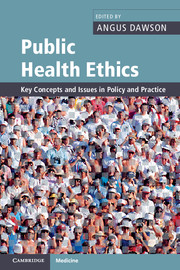Book contents
- Frontmatter
- Contents
- List of contributors
- Preface
- Acknowledgements
- Section 1 Concepts
- Section 2 Issues
- 5 Smoking, health and ethics
- 6 Infectious disease control
- 7 Population screening
- 8 Vaccination ethics
- 9 Environment, ethics and public health
- 10 Public health research ethics
- 11 Equity and population health
- 12 Health inequities
- Index
- References
9 - Environment, ethics and public health
The climate change dilemma
Published online by Cambridge University Press: 05 July 2011
- Frontmatter
- Contents
- List of contributors
- Preface
- Acknowledgements
- Section 1 Concepts
- Section 2 Issues
- 5 Smoking, health and ethics
- 6 Infectious disease control
- 7 Population screening
- 8 Vaccination ethics
- 9 Environment, ethics and public health
- 10 Public health research ethics
- 11 Equity and population health
- 12 Health inequities
- Index
- References
Summary
In this chapter we explore the relationship between the environment, ethics and public health (Kessel, 2006). To do this we take the theme of climate change and public health (with climate representing the natural environment), and we examine the relationship between our climatic environment and public health ethics. We illustrate the changing relationship between public health and the environment, and examine the place of ethics in the relationship between the environment and public health. In particular, we critique the status of utilitarianism as a moral foundation for public health. The importance of environmental justice, environmental philosophy and development ethics to the future of public health are discussed.
Background: definitions and methods
As an introduction to this chapter it is important to refer to some difficulties around definitions, and also to briefly describe the methods used. To philosophers definitions are often key to their debates. For one philosopher in particular, Ludwig Wittgenstein, issues to do with definitions are at the root of all philosophical problems (Elliott, 2001). A look at the words used in the title of this chapter readily illustrates the challenges of writing on this topic. To Socrates, ethics was about how we ought to live, and why. More contemporarily, however, ethics has been divided into normative ethics (systematic examination of organized theories) and speculative (or reflective) ethics (Honer et al., 2006). In this chapter we look at moral theories as well as adopting a more speculative approach.
- Type
- Chapter
- Information
- Public Health EthicsKey Concepts and Issues in Policy and Practice, pp. 154 - 173Publisher: Cambridge University PressPrint publication year: 2011
References
- 5
- Cited by



